| | | | | | | Presented By Babbel | | | | Axios World | | By Dave Lawler · Aug 01, 2022 | | Welcome back to Axios World. - Tonight's edition (1,766 words, 7 minutes) starts with House Speaker Nancy Pelosi's expected arrival in Taiwan tomorrow, before jumping into tonight's breaking news about a major CIA operation in Kabul.
New arrival? Subscribe. | | | | | | 1 big thing: Why Pelosi's Taiwan visit matters to China | 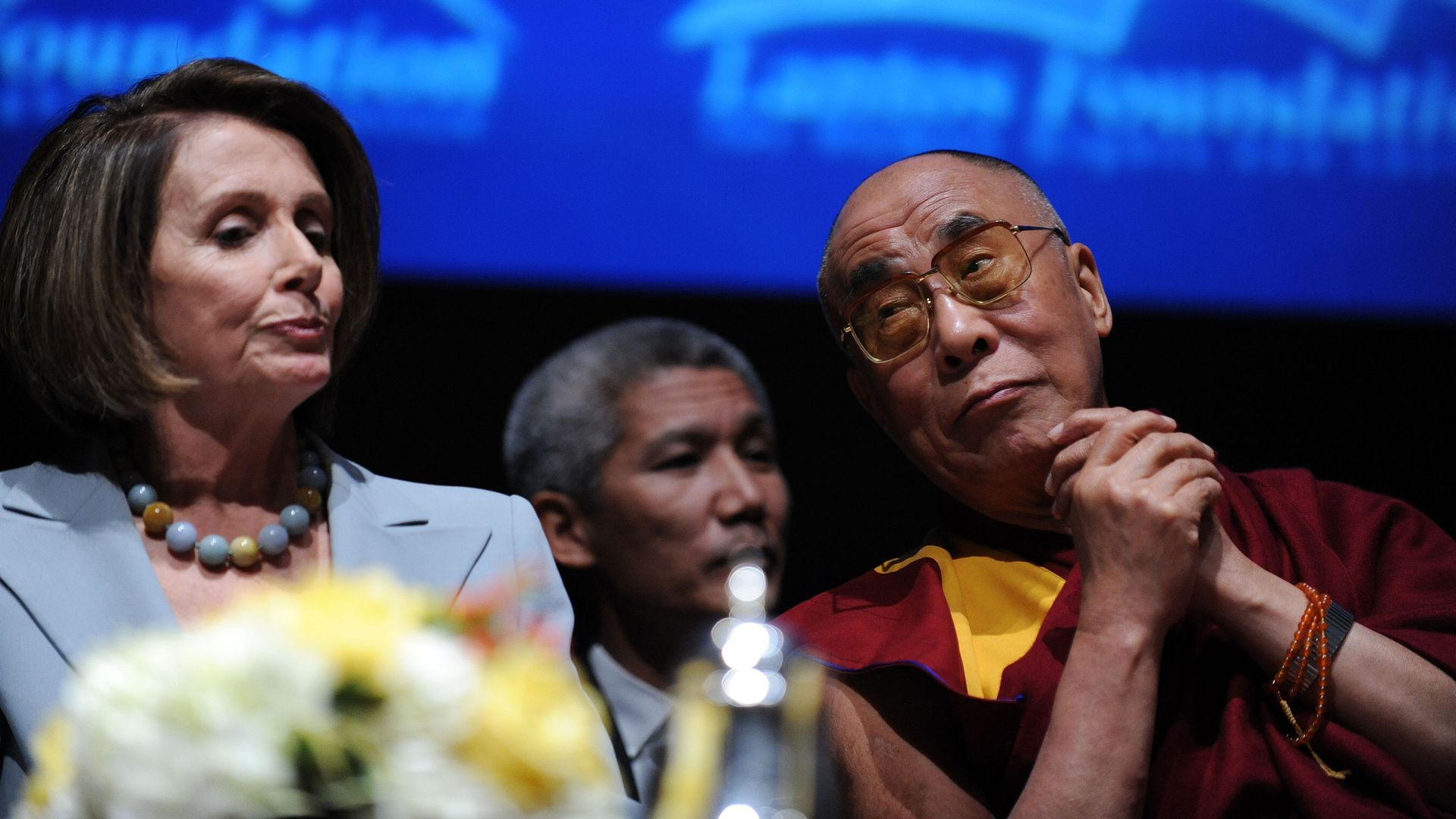 | | | Pelosi with the Dalai Lama in 2014. Photo: Tim Sloan/AFP via Getty | | | | China is promising a "strong and resolute" military response to House Speaker Nancy Pelosi's expected arrival in Taiwan tomorrow. - According to National Security Council spokesperson John Kirby, Beijing's "provocations" are likely to include missiles fired into the Taiwan Strait and a large-scale breach of Taiwan's air defense zone.
- China has already announced new military exercises in the South China Sea.
What they're saying: Kirby argued that such reactions would be totally disproportionate, because there is precedent for Pelosi's visit — then-Speaker Newt Gingrich traveled to Taiwan in 1997, and lower-level lawmakers have visited as recently as this year — and U.S. policy on Taiwan is unchanged. The other side: China's government sees things very differently. - For one thing, Gingrich had three days of meetings in Beijing before stopping in Taipei, notes Ryan Hass, a Brookings fellow and former NSC director for China and Taiwan.
- China's relative strength has increased dramatically since then, as has the degree of deference it demands — particularly over Taiwan, which it claims is an integral part of its territory.
Then there's Pelosi herself. - "The Chinese have very strong feelings about the speaker," Hass tells Axios. Her public protest in Beijing over the Tiananmen Square massacre was more or less her "first foray on the national stage," he notes.
- She's taken high-profile stands for decades on Tibet and other human rights issues that infuriate Beijing.
- Now, she's third in line to the presidency and expected to make the trip despite weeks of warnings of "serious consequences." She hasn't confirmed the visit, but several media outlets have. She'll meet Taiwan's president on Wednesday morning, per the FT.
The trip would come at the peak of China's annual military training cycle, a day after a public holiday celebrating the People's Liberation Army, and as high-level Communist officials gather for an annual retreat, Hass notes. - More importantly, it comes ahead of the Party Congress at which President Xi Jinping is expected to seek a third term, making this an inopportune time for him to show any weakness over Taiwan.
- "President Xi has spent the last 10 years investing in building a political brand of being strong, resolute, and standing firm in the face of American pressure," Hass says.
- At this critical juncture, "all the political incentives will point him towards erring on the side of muscularity in response," Hass adds.
The big picture: A showdown over Taiwan was always possible even without Pelosi's trip. - When Xi — who has vowed repeatedly to capture Taiwan, by force if necessary — warned President Biden not to "play with fire" over Taiwan last Thursday, he was repeating language he used in their virtual summit last year.
- And while Biden said publicly that the U.S. military felt Pelosi's trip was "not a good idea right now," he's also riled Beijing by saying repeatedly that the U.S. will defend Taiwan against an invasion.
What to watch: China is unlikely to take any action that endangers Pelosi or presents a real risk of war. - The longer-term question is whether the U.S. and China will be able to reset on Taiwan and find a stable status quo. If not, the possibility of a much larger confrontation over the island will loom larger, and potentially closer.
|     | | | | | | 2. Breaking: U.S. killed al-Qaeda leader Zawahiri |  | | | Photo: FBI | | | | The CIA killed al-Qaeda leader Ayman al-Zawahiri in a drone strike in Kabul over the weekend, AP reports. President Biden is set to speak imminently on what the White House called a "successful counterterrorism operation." Why it matters: Zawahiri was second-in-command to Osama bin Laden during the September 11 attacks, and succeeded him after his death. The Egyptian-born medical doctor helped develop al-Qaeda into a global terror network and establish the United States as its primary target. - The fact that he was killed in Afghanistan is a testament to the U.S. ability to conduct "over-the-horizon" counterterrorism operations there even after exiting the country one year ago, but will also be yet another point of contention with the Taliban.
- The house Zawahiri was killed in was owned by a close aide to senior Taliban leader Sirajuddin Haqqani, per AP, indicating the Taliban likely knew of his presence in Afghanistan. The Taliban also condemned the strike as a violation of Afghan sovereignty.
What to watch: You'll start seeing a lot more details about the operation after Biden starts speaking. |     | | | | | | 3. Hotspots burn hotter |  | | | U.S. NATO soldiers near a roadblock in northern Kosovo. Photo: Armend Nimani/AFP via Getty | | | | NATO peacekeepers helped clear roadblocks in northern Kosovo today following chaotic scenes overnight that led NATO to warn it was "prepared to intervene if stability is jeopardized." Driving the news: In order to de-escalate the situation, Kosovo delayed the implementation of two controversial policies, at the urging of the U.S. and EU. - The policies will require ethnic Serbs living in Kosovo to use license plates issued by Kosovo's government (rather than by Serbia), and require visitors from Serbia to obtain additional documentation (as is required for travel in the opposite direction).
- Protesters blocked traffic for several days, and Kosovo authorities say they fired at authorities at border checkpoints on Sunday, though no one was injured. Kosovo Prime Minister Albin Kurti accused Serbian President Aleksandar Vučić' of whipping up the unrest.
- Serbia has never recognized Kosovo's independence. NATO intervened during the Kosovo War in 1999 and still has around 4,000 troops in Kosovo.
Worth noting: Moscow has backed its Serbian allies and accused Washington and Brussels of complicity in discrimination from Kosovo against its Serbian minority. - Vučić', meanwhile, has said Serbia wants peace but, "if they try to start persecuting Serbs, bullying Serbs, killing Serbs, Serbia will win!"
Zoom out: The Kosovo War isn't the only brutal conflict from the 1990s that is back in the news this week. - Secretary of State Tony Blinken will visit the Democratic Republic of the Congo and Rwanda next week to try to dial back tensions over a cross-border conflict with echoes of the devastating Congo wars of the 1990s.
- Meanwhile, there are unconfirmed reports out of Armenia that Azerbaijan is violating the ceasefire in Nagorno-Karabakh.
|     | | | | | | A message from Babbel | | Get conversational in a new language | | |  | | | | Babbel offers bite-sized, 10-minute language lessons developed by over 150 linguists and voiced by native speakers. The impact: Users report being able to have a basic conversation after just three weeks of daily practice using Babbel. For a limited time, get up to 60% off your subscription. | | | | | | Bonus: Where in the World | 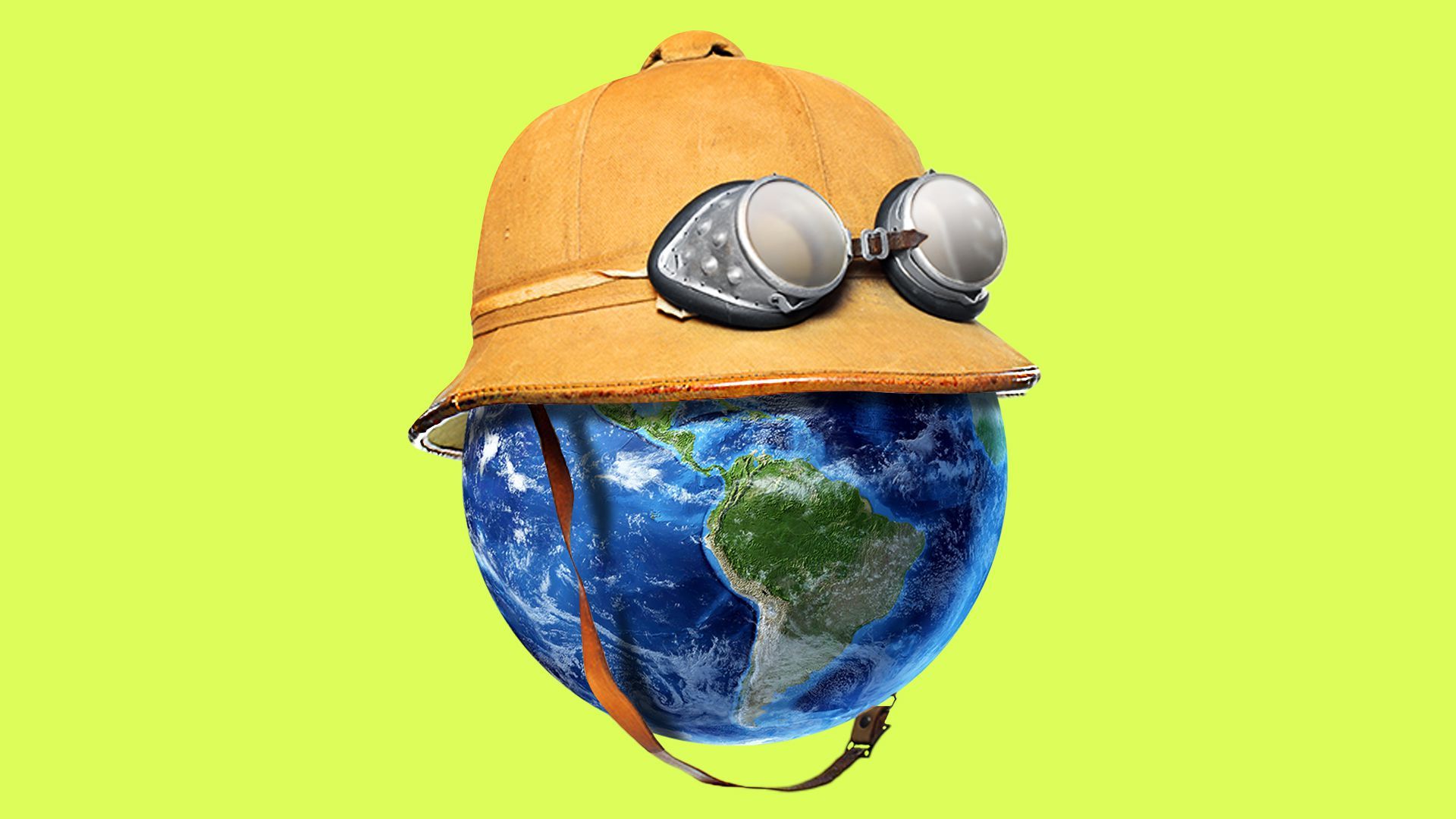 | | | Illustration: Natalie Peeples/Axios | | | | In today's puzzle, we're looking for big, sparsely populated countries. - I've used some U.S. states as benchmarks, so apologies to our international readers. If it helps, Texas is a bit larger than France or Ukraine, and Maine is similar in population density to Finland or Norway.
- Apologies as well to Denmark, which could've gone far here due to its control of Greenland, but which I've eliminated to avoid any confusion.
- Finally, apologies more generally, as I think this one is pretty darn tough.
Hint: The two answers are nowhere near each other. - Bigger than Texas (38 countries left)
- Fully in Eastern Hemisphere* (25 countries left)
- More sparsely populated than Maine (7 countries)
- Does not touch the Sahara or Arabian deserts (4 countries)
- Gained independence in 1990 or 1991 (2 countries)
*Sorry to Algeria, Mali, and Russia (just barely) which cross into both east and west. Scroll to bottom for answers. |     | | | | | | 4. Global news roundup | 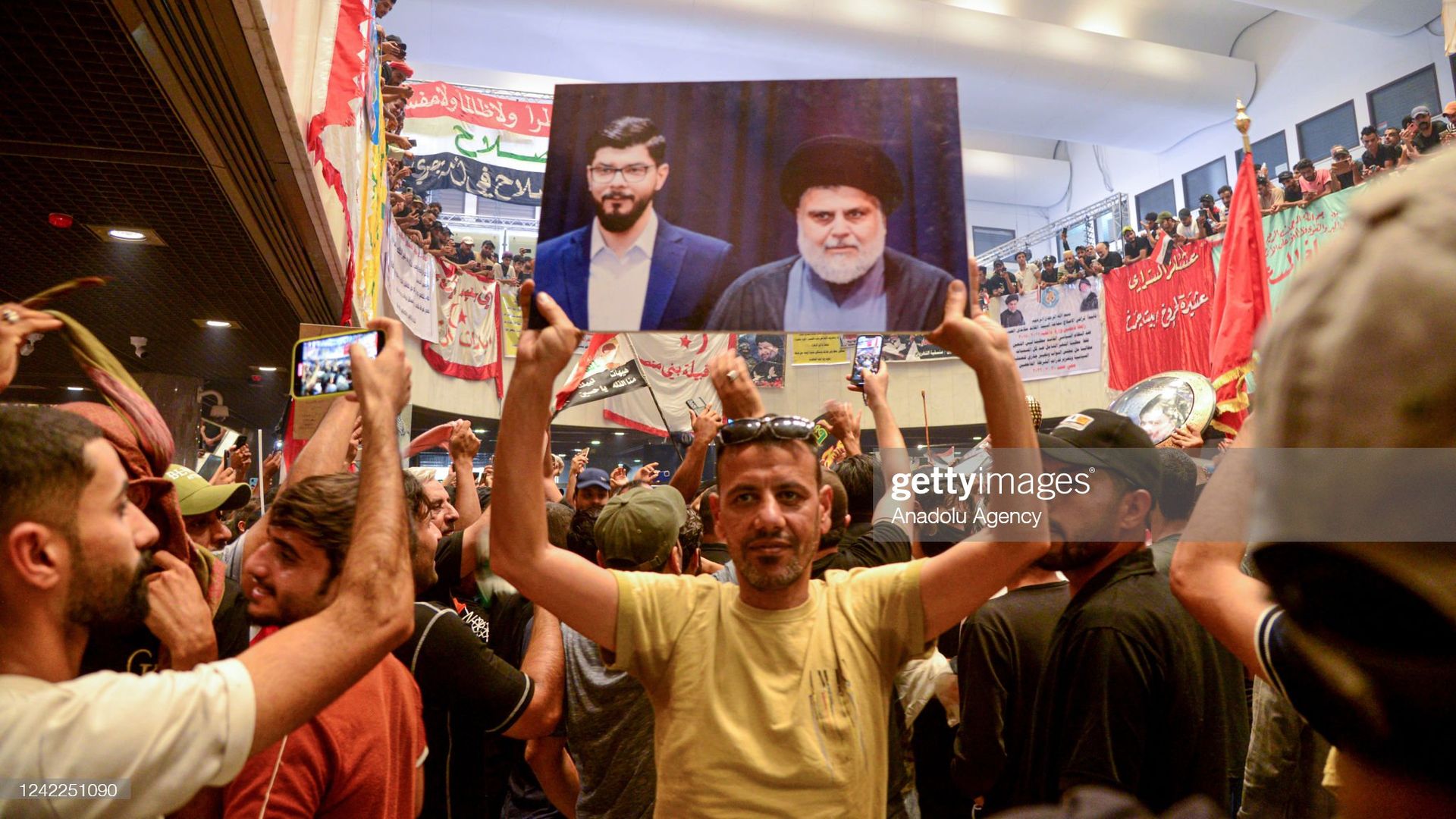 | | | Supporters of Shiite cleric Muqtada al-Sadr continue a sit-in protest in Parliament. Photo: Abdullah Ali/Anadolu Agency via Getty | | | | Axios' Laurin-Whitney Gottbrath rounds up the latest news: 1. The political crisis in Iraq escalated today after thousands rallied in a counterprotest against supporters of cleric Muqtada al-Sadr who are continuing to stage a sit-in inside Iraq's parliament, per AP. - Context: Supporters of al-Sadr, whose faction won a plurality in elections last October, stormed the parliament building last week, calling for an end to the nearly 10-month political deadlock.
2. The first ship carrying grain left Ukraine's port of Odesa today under a UN-brokered deal to help ease the global food crisis, Axios' Rebecca Falconer reports. 3. Separately in Ukraine, President Volodymyr Zelensky yesterday ordered the evacuation of the Donetsk region, where the fight against Russian forces continues at full force, Axios' Julia Shapero writes. - "The sooner it is done, the more people leave Donetsk region now, the fewer people the Russian army will have time to kill," Zelensky said.
4. Spain and Brazil both reported monkeypox-related deaths late last week Friday — marking the first deaths from the disease outside of Africa. - The big picture: Sudan late Sunday announced it had detected its first case.
|     | | | | | | 5. Aid groups call for Yemen ceasefire extension | 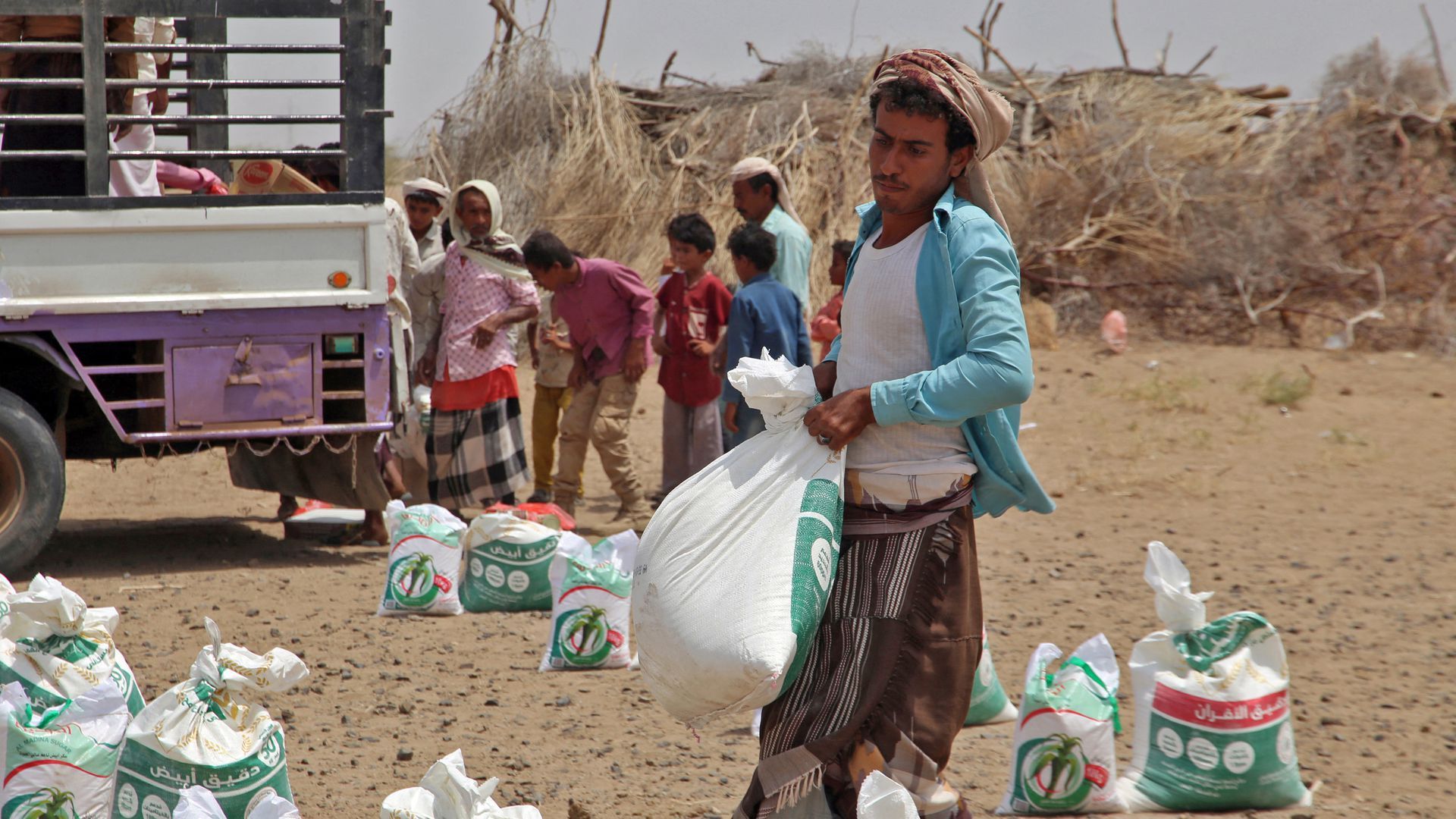 | | | Yemenis displaced by the conflict receive food aid and supplies in March. Photo: Khaled Ziad/AFP via Getty Images | | | | Dozens of aid groups are calling on warring parties in Yemen to extend an UN-brokered truce that is set to expire tomorrow, Laurin-Whitney Gottbrath writes. What they're saying: Since the ceasefire took effect in April, "ordinary Yemenis have experienced the longest period of calm in the country in over seven years," more than 30 humanitarian organizations, including Oxfam and Save the Children said in a press release Sunday. The big picture: Since fighting between a Saudi-led coalition and the Iran-back Houthi rebels began in 2015, hundreds of thousands have died of direct and indirect causes, and more than 4.2 million people have been internally displaced. - Up to 19 million Yemenis will be food insecure by the end of the year, including 160,000 who are expected to face famine-like conditions.
- The truce has allowed a limited resumption of activity at Sana'a and the crucial Hodeidah port, allowing more than 8,000 Yemenis "to access lifesaving medical care, pursue education and business opportunities, and reunite with loved ones," the aid groups said.
State of play: During his visit to Saudi Arabia last month, President Biden said Saudi officials had agreed to "deepen and extend" the ceasefire in Yemen. But no official extension has been announced and the warring parties appear to be still far apart, the Washington Post writes. |     | | | | | | 6. What I'm watching: Zambia debt deal hailed as breakthrough |  | | | Xi (R) shakes hands in 2018 with Zambia's then-President Edgar Lungu. Photo: Nicolas Asfouri/AFP via Getty | | | | China has agreed to provide debt relief to Zambia in order to allow for an IMF bailout for the southern African country, which defaulted on its debts during the pandemic. Why it matters: A number of developing countries will face a growing risk of default in the coming months, and China — the biggest bilateral lender to poor counties — has previously handled debt renegotiations one-on-one, behind closed doors. - But Beijing made this announcement in conjunction with Zambia's other creditors.
- It "is the first real test of a process created by the G-20 in late 2020 aimed at getting China... to join international debt-relief efforts when these countries run into payment trouble," the WSJ notes.
|     | | | | | | 7. Stories we're watching | 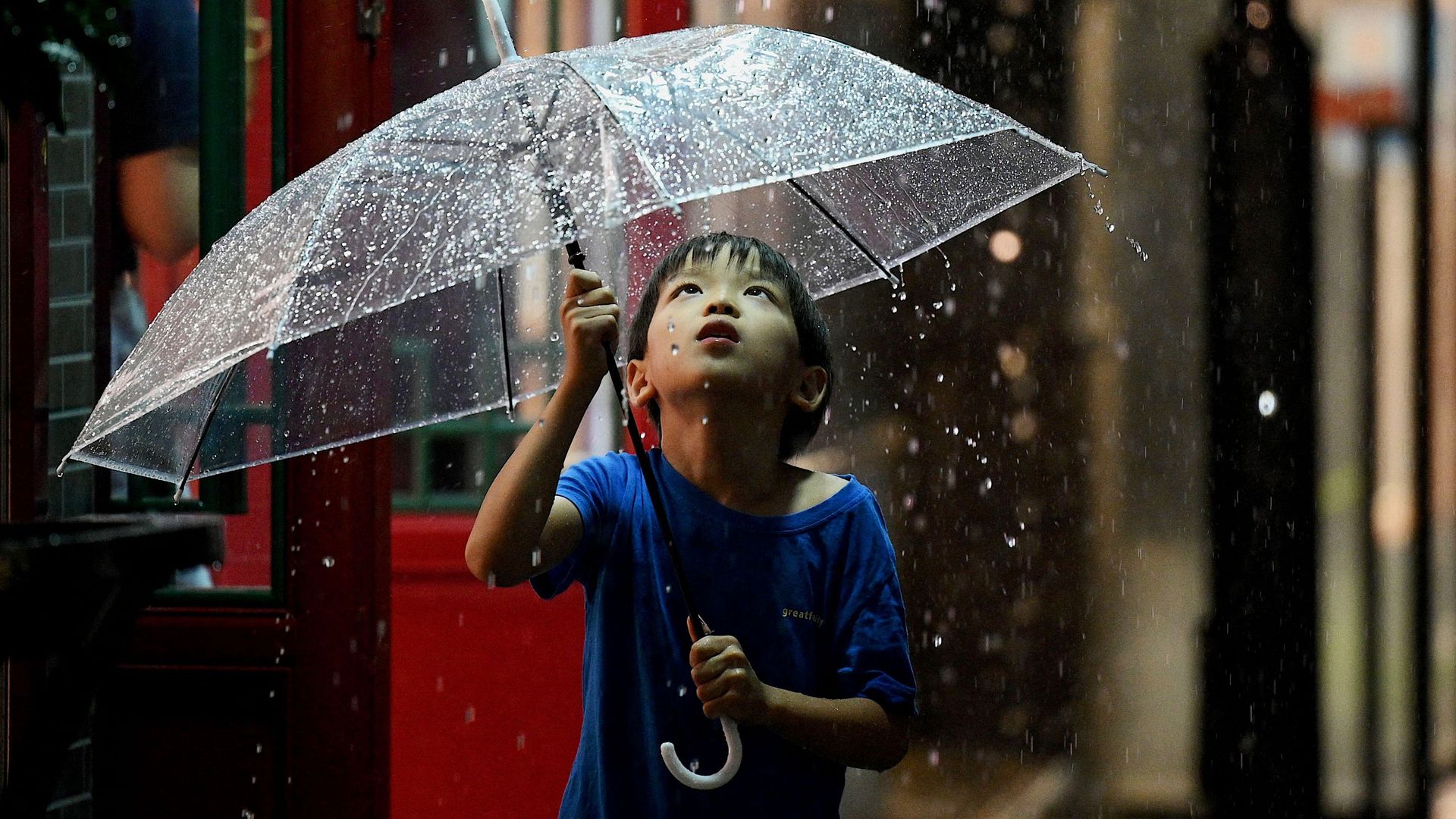 | | | Rain in Beijing. Photo: Noel Celis/AFP via Getty Images | | | - Pope Francis is considering retirement
- Blinken urged Russia to accept Griner prisoner swap
- New Iran sanctions
- Ukraine latest: More weapons coming; Ukraine wants international inquiry into strike on POWs; U.S. admits 100,000 Ukrainians.
- New bill to boost U.S. government expertise on China
- New Zealand borders fully reopen
- Kushner: Trump wanted to endorse Netanyahu rival
Quoted: "I have asked ministers, all public officials, and I would like to ask the private sector too, if they haven't already done so, not to wear a tie when it isn't necessary." — Spanish Prime Minister Pedro Sánchez with a sartorial recommendation that's intended to save energy, and which should be made mandatory in August in Washington, D.C. |     | | | | | | A message from Babbel | | Start speaking a new language in just 3 weeks | | |  | | | | Babbel helps millions of people speak and understand a new language through its scientifically proven teaching method. The deets: The platform offers multiple ways to learn a language through daily lessons, podcasts, games, live online classes and more. Get up to 60% off your subscription. | | | | Answers: Kazakhstan (independence from USSR) and Namibia (independence from South Africa). |  | | Are you a fan of this email format? It's called Smart Brevity®. Over 300 orgs use it — in a tool called Axios HQ — to drive productivity with clearer workplace communications. | | | | | | Axios thanks our partners for supporting our newsletters. If you're interested in advertising, learn more here.
Sponsorship has no influence on editorial content. Axios, 3100 Clarendon Blvd, Arlington VA 22201 | | | You received this email because you signed up for newsletters from Axios.
Change your preferences or unsubscribe here. | | | Was this email forwarded to you?
Sign up now to get Axios in your inbox. | | | | Follow Axios on social media:    | | | | | |












No comments:
Post a Comment